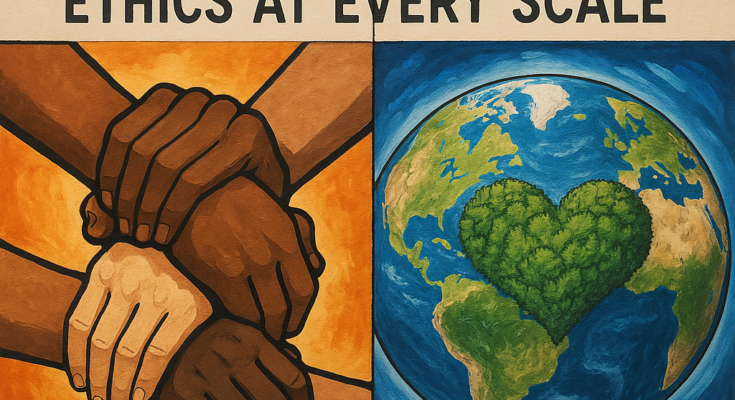What Are Ethics? The Universal Compass Guiding Humanity
Ethics are the invisible rules that steer us toward kindness, fairness, and respect—like a moral GPS embedded in our souls. They shape how we treat others, make choices, and define what’s “right” versus “wrong.” Think honesty, integrity, compassion, and justice. But where do these principles come from? Are they innate, taught, or divinely inspired? Let’s unravel the threads of ethics, religion, and their role in shaping individuals—and nations.
Ethics 101: More Than Just Rules
Ethics aren’t a dusty rulebook. They’re the heartbeat of human connection, blending:
- Innate instincts (Ever felt guilty for lying? That’s your inner ethicist talking).
- Learned values (Thank your parents for those “share your toys” lessons).
- Cultural & religious influences (What’s praised in one society might be taboo in another).
From holding the door for a stranger to whistleblowing on corruption, ethics are the glue holding societies together.
Religion’s Role: Divine Blueprint or Human Fabrication?
Religions have long been ethics’ loudest cheerleaders. They frame morality through stories, commandments, and cosmic consequences:
- Carrots & Sticks: Heaven’s rewards, hellfire warnings, and karma’s balancing act.
- Universal Values: Compassion in Buddhism, justice in Judaism, charity in Islam, love in Christianity.
But here’s the twist: You don’t need religion to be ethical. Atheists and agnostics often champion human rights, proving ethics can thrive on reason and empathy alone. Still, for billions, faith provides a scaffolding for moral choices—a divine “why” behind every “don’t.”
Which Religion “Wins” at Ethics? Spoiler: It’s Not a Competition
Every major faith preaches love, honesty, and justice. But let’s spotlight Islam’s unique angle:
- Prophet Muhammad’s Mission: “I was sent to perfect good character.”
- Quranic Commands: Over 100 verses link faith to action—like charity (zakat) and honesty in trade.
- Daily Ethics: From honoring neighbors to protecting the environment, Islam ties worship to everyday kindness.
Yet Buddhism’s Eightfold Path and Jesus’ Sermon on the Mount offer equally profound guides. The “best” faith? The one that inspires you to act justly.
Nations Behaving Badly: Can Countries Have Ethics?
Ethics aren’t just for people. Nations, too, face moral tests:
- Political Ethics: Will a leader prioritize people over power?
- War Ethics: Bombing hospitals? Targeting civilians? Both violate Islamic law and international treaties.
- Global Justice: Sending aid to disaster zones vs. exploiting weaker nations for resources.
The Ugly Truth: Countries often ditch ethics when profits or politics beckon. Colonialism, modern wars, and climate inaction reveal a harsh gap between ideals and reality.
The Big Question: Can We Build a Moral World?
Ethics start at home—but don’t stop there. Imagine a world where:
- Individuals refuse to cheat, even when no one’s watching.
- Corporations prioritize planet over profit.
- Governments defend human dignity, not just borders.
It’s a tall order, but history’s heroes—from Gandhi to Malala—prove change is possible. The real challenge? Making ethics irresistible, not just obligatory.


